Competitive Strategy Report: British Petroleum's Russian Operations
VerifiedAdded on 2022/11/19
|16
|3334
|306
Report
AI Summary
This report provides a comprehensive analysis of British Petroleum's (BP) competitive strategy, specifically focusing on its operations in Russia. The report begins with an executive summary outlining the key issues and recommendations. It then delves into the case background, highlighting BP's joint ventures with Rosneft and AAR and the challenges these partnerships pose. The core of the report identifies strategic issues through SWOT, PESTLE, and Porter's Five Forces analyses, revealing internal weaknesses like reliance on joint ventures and external challenges such as political and economic factors. The competitive analysis underscores the high rivalry and threat of substitutes in the Russian market. Based on these findings, the report recommends that BP implement an international strategy and diversification to mitigate risks and enhance its competitive position. The report concludes by summarizing the key findings and recommendations, emphasizing the need for BP to adapt its strategies to navigate the complexities of the Russian market effectively.
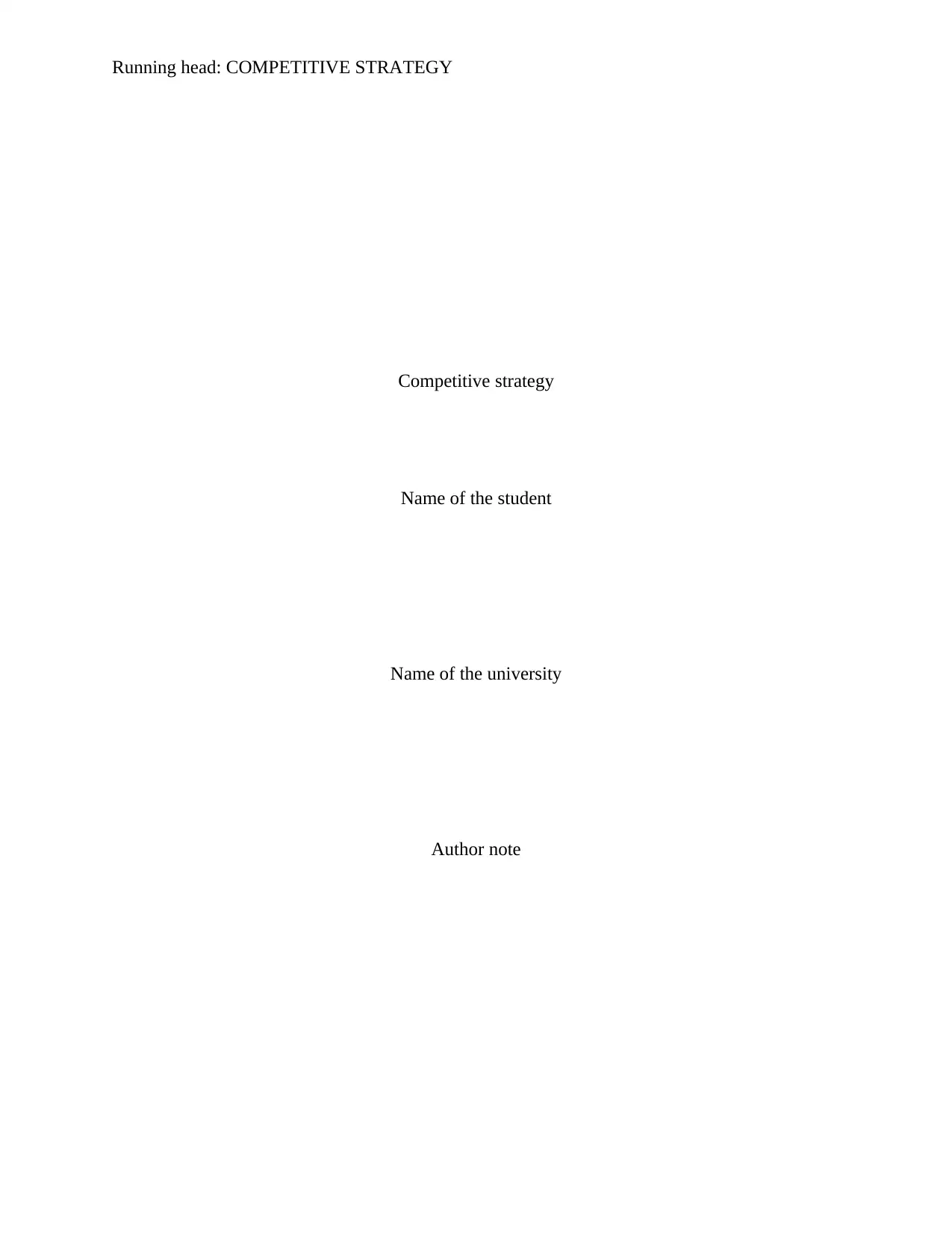
Running head: COMPETITIVE STRATEGY
Competitive strategy
Name of the student
Name of the university
Author note
Competitive strategy
Name of the student
Name of the university
Author note
Paraphrase This Document
Need a fresh take? Get an instant paraphrase of this document with our AI Paraphraser
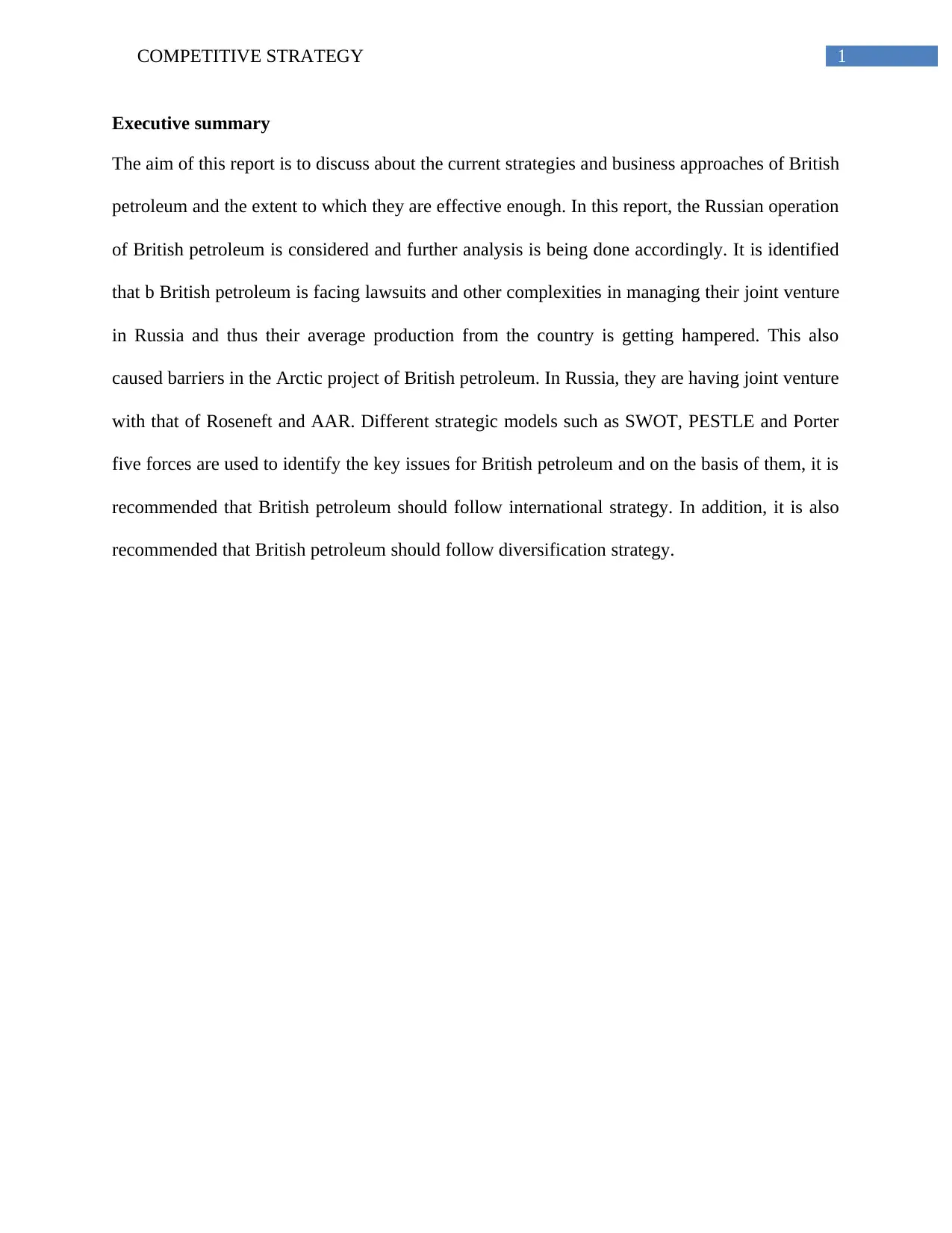
1COMPETITIVE STRATEGY
Executive summary
The aim of this report is to discuss about the current strategies and business approaches of British
petroleum and the extent to which they are effective enough. In this report, the Russian operation
of British petroleum is considered and further analysis is being done accordingly. It is identified
that b British petroleum is facing lawsuits and other complexities in managing their joint venture
in Russia and thus their average production from the country is getting hampered. This also
caused barriers in the Arctic project of British petroleum. In Russia, they are having joint venture
with that of Roseneft and AAR. Different strategic models such as SWOT, PESTLE and Porter
five forces are used to identify the key issues for British petroleum and on the basis of them, it is
recommended that British petroleum should follow international strategy. In addition, it is also
recommended that British petroleum should follow diversification strategy.
Executive summary
The aim of this report is to discuss about the current strategies and business approaches of British
petroleum and the extent to which they are effective enough. In this report, the Russian operation
of British petroleum is considered and further analysis is being done accordingly. It is identified
that b British petroleum is facing lawsuits and other complexities in managing their joint venture
in Russia and thus their average production from the country is getting hampered. This also
caused barriers in the Arctic project of British petroleum. In Russia, they are having joint venture
with that of Roseneft and AAR. Different strategic models such as SWOT, PESTLE and Porter
five forces are used to identify the key issues for British petroleum and on the basis of them, it is
recommended that British petroleum should follow international strategy. In addition, it is also
recommended that British petroleum should follow diversification strategy.
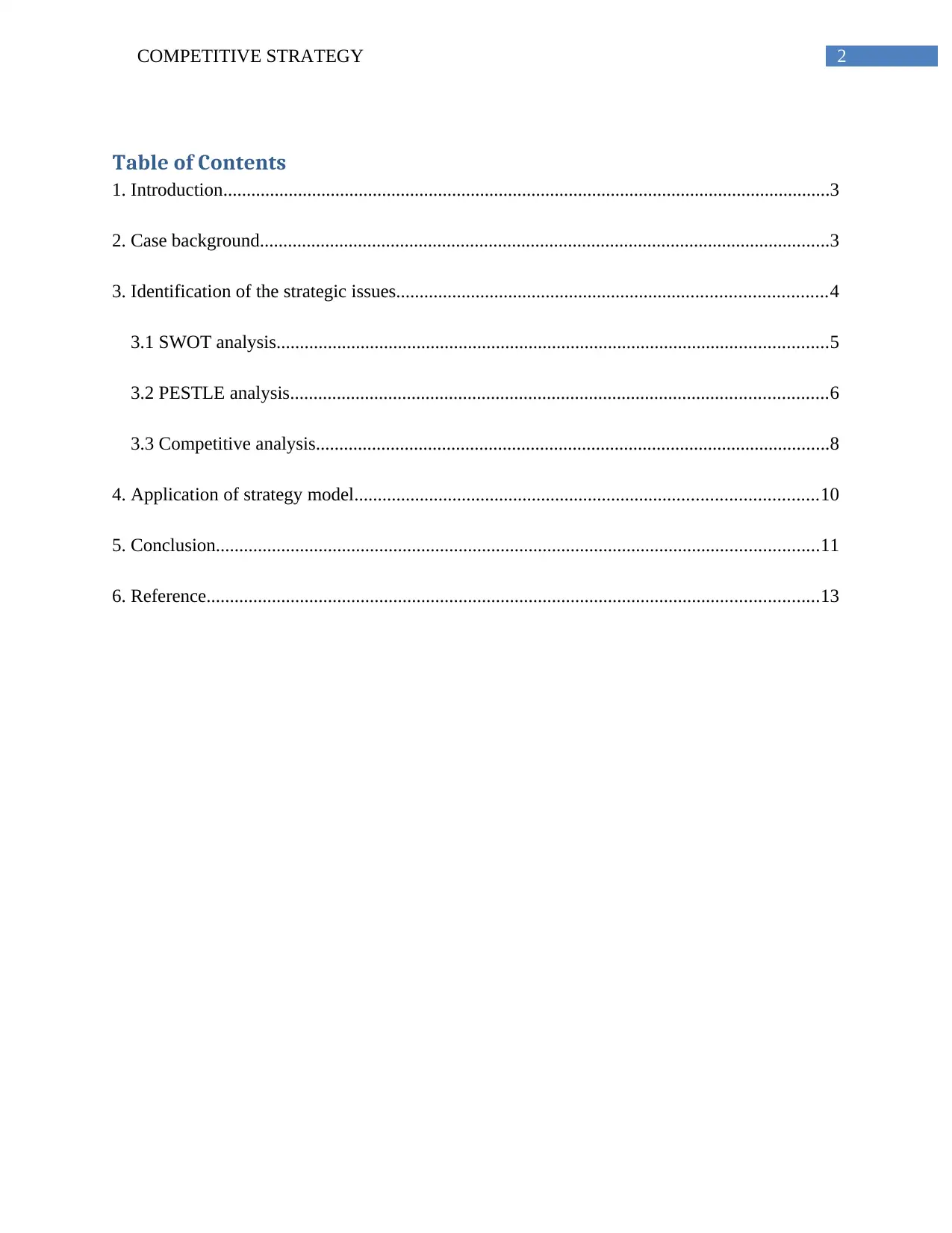
2COMPETITIVE STRATEGY
Table of Contents
1. Introduction..................................................................................................................................3
2. Case background..........................................................................................................................3
3. Identification of the strategic issues............................................................................................4
3.1 SWOT analysis......................................................................................................................5
3.2 PESTLE analysis...................................................................................................................6
3.3 Competitive analysis..............................................................................................................8
4. Application of strategy model...................................................................................................10
5. Conclusion.................................................................................................................................11
6. Reference...................................................................................................................................13
Table of Contents
1. Introduction..................................................................................................................................3
2. Case background..........................................................................................................................3
3. Identification of the strategic issues............................................................................................4
3.1 SWOT analysis......................................................................................................................5
3.2 PESTLE analysis...................................................................................................................6
3.3 Competitive analysis..............................................................................................................8
4. Application of strategy model...................................................................................................10
5. Conclusion.................................................................................................................................11
6. Reference...................................................................................................................................13
⊘ This is a preview!⊘
Do you want full access?
Subscribe today to unlock all pages.

Trusted by 1+ million students worldwide
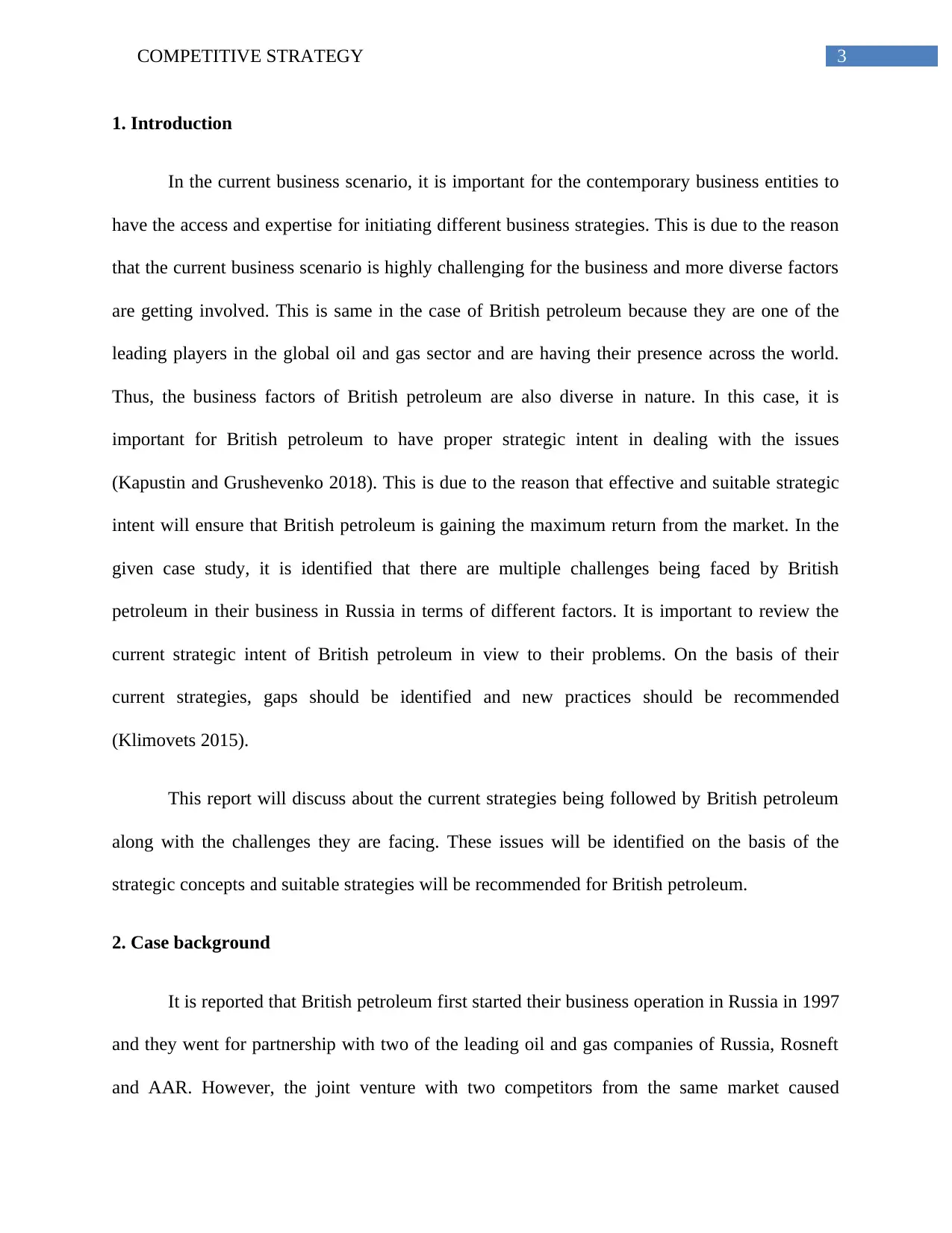
3COMPETITIVE STRATEGY
1. Introduction
In the current business scenario, it is important for the contemporary business entities to
have the access and expertise for initiating different business strategies. This is due to the reason
that the current business scenario is highly challenging for the business and more diverse factors
are getting involved. This is same in the case of British petroleum because they are one of the
leading players in the global oil and gas sector and are having their presence across the world.
Thus, the business factors of British petroleum are also diverse in nature. In this case, it is
important for British petroleum to have proper strategic intent in dealing with the issues
(Kapustin and Grushevenko 2018). This is due to the reason that effective and suitable strategic
intent will ensure that British petroleum is gaining the maximum return from the market. In the
given case study, it is identified that there are multiple challenges being faced by British
petroleum in their business in Russia in terms of different factors. It is important to review the
current strategic intent of British petroleum in view to their problems. On the basis of their
current strategies, gaps should be identified and new practices should be recommended
(Klimovets 2015).
This report will discuss about the current strategies being followed by British petroleum
along with the challenges they are facing. These issues will be identified on the basis of the
strategic concepts and suitable strategies will be recommended for British petroleum.
2. Case background
It is reported that British petroleum first started their business operation in Russia in 1997
and they went for partnership with two of the leading oil and gas companies of Russia, Rosneft
and AAR. However, the joint venture with two competitors from the same market caused
1. Introduction
In the current business scenario, it is important for the contemporary business entities to
have the access and expertise for initiating different business strategies. This is due to the reason
that the current business scenario is highly challenging for the business and more diverse factors
are getting involved. This is same in the case of British petroleum because they are one of the
leading players in the global oil and gas sector and are having their presence across the world.
Thus, the business factors of British petroleum are also diverse in nature. In this case, it is
important for British petroleum to have proper strategic intent in dealing with the issues
(Kapustin and Grushevenko 2018). This is due to the reason that effective and suitable strategic
intent will ensure that British petroleum is gaining the maximum return from the market. In the
given case study, it is identified that there are multiple challenges being faced by British
petroleum in their business in Russia in terms of different factors. It is important to review the
current strategic intent of British petroleum in view to their problems. On the basis of their
current strategies, gaps should be identified and new practices should be recommended
(Klimovets 2015).
This report will discuss about the current strategies being followed by British petroleum
along with the challenges they are facing. These issues will be identified on the basis of the
strategic concepts and suitable strategies will be recommended for British petroleum.
2. Case background
It is reported that British petroleum first started their business operation in Russia in 1997
and they went for partnership with two of the leading oil and gas companies of Russia, Rosneft
and AAR. However, the joint venture with two competitors from the same market caused
Paraphrase This Document
Need a fresh take? Get an instant paraphrase of this document with our AI Paraphraser
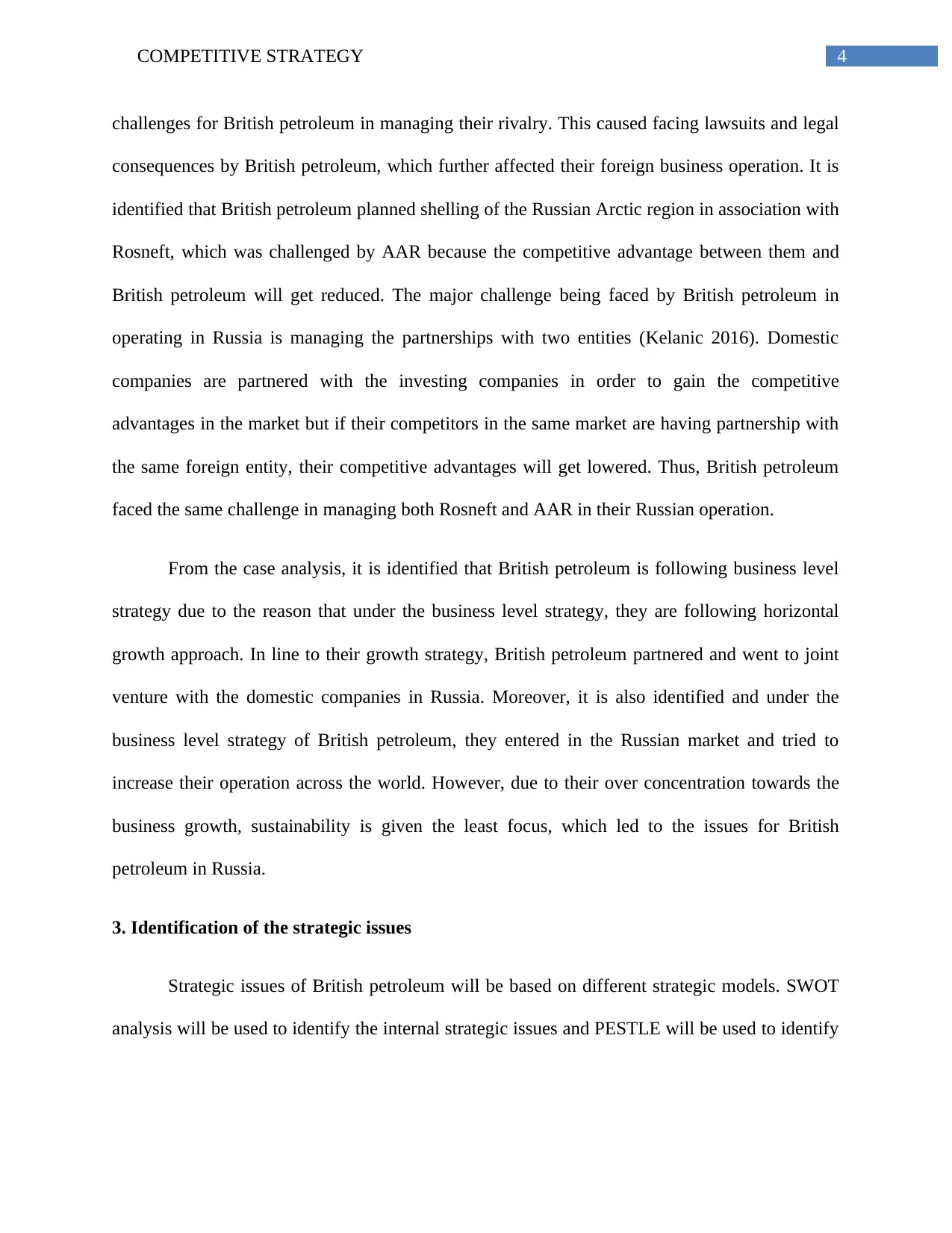
4COMPETITIVE STRATEGY
challenges for British petroleum in managing their rivalry. This caused facing lawsuits and legal
consequences by British petroleum, which further affected their foreign business operation. It is
identified that British petroleum planned shelling of the Russian Arctic region in association with
Rosneft, which was challenged by AAR because the competitive advantage between them and
British petroleum will get reduced. The major challenge being faced by British petroleum in
operating in Russia is managing the partnerships with two entities (Kelanic 2016). Domestic
companies are partnered with the investing companies in order to gain the competitive
advantages in the market but if their competitors in the same market are having partnership with
the same foreign entity, their competitive advantages will get lowered. Thus, British petroleum
faced the same challenge in managing both Rosneft and AAR in their Russian operation.
From the case analysis, it is identified that British petroleum is following business level
strategy due to the reason that under the business level strategy, they are following horizontal
growth approach. In line to their growth strategy, British petroleum partnered and went to joint
venture with the domestic companies in Russia. Moreover, it is also identified and under the
business level strategy of British petroleum, they entered in the Russian market and tried to
increase their operation across the world. However, due to their over concentration towards the
business growth, sustainability is given the least focus, which led to the issues for British
petroleum in Russia.
3. Identification of the strategic issues
Strategic issues of British petroleum will be based on different strategic models. SWOT
analysis will be used to identify the internal strategic issues and PESTLE will be used to identify
challenges for British petroleum in managing their rivalry. This caused facing lawsuits and legal
consequences by British petroleum, which further affected their foreign business operation. It is
identified that British petroleum planned shelling of the Russian Arctic region in association with
Rosneft, which was challenged by AAR because the competitive advantage between them and
British petroleum will get reduced. The major challenge being faced by British petroleum in
operating in Russia is managing the partnerships with two entities (Kelanic 2016). Domestic
companies are partnered with the investing companies in order to gain the competitive
advantages in the market but if their competitors in the same market are having partnership with
the same foreign entity, their competitive advantages will get lowered. Thus, British petroleum
faced the same challenge in managing both Rosneft and AAR in their Russian operation.
From the case analysis, it is identified that British petroleum is following business level
strategy due to the reason that under the business level strategy, they are following horizontal
growth approach. In line to their growth strategy, British petroleum partnered and went to joint
venture with the domestic companies in Russia. Moreover, it is also identified and under the
business level strategy of British petroleum, they entered in the Russian market and tried to
increase their operation across the world. However, due to their over concentration towards the
business growth, sustainability is given the least focus, which led to the issues for British
petroleum in Russia.
3. Identification of the strategic issues
Strategic issues of British petroleum will be based on different strategic models. SWOT
analysis will be used to identify the internal strategic issues and PESTLE will be used to identify
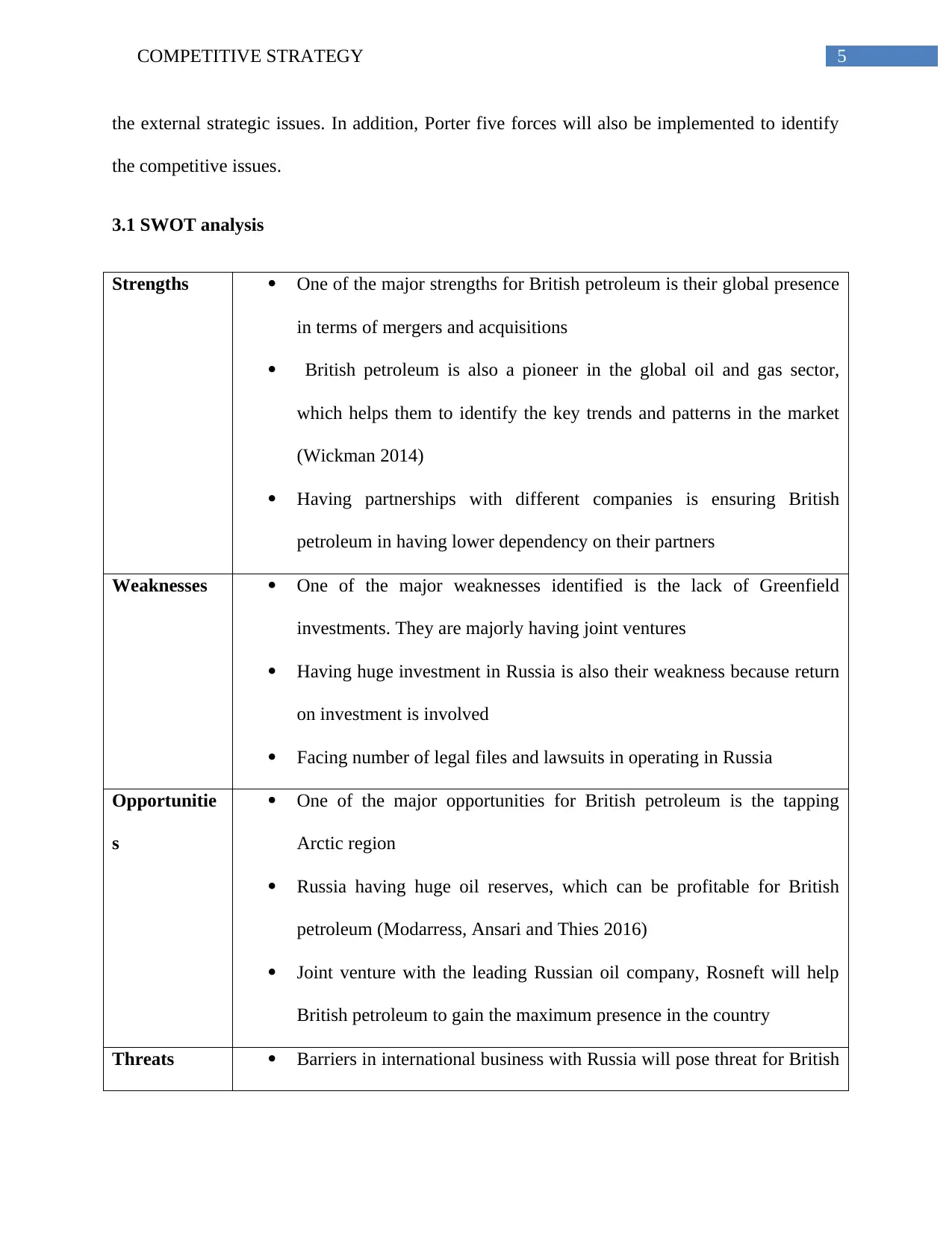
5COMPETITIVE STRATEGY
the external strategic issues. In addition, Porter five forces will also be implemented to identify
the competitive issues.
3.1 SWOT analysis
Strengths One of the major strengths for British petroleum is their global presence
in terms of mergers and acquisitions
British petroleum is also a pioneer in the global oil and gas sector,
which helps them to identify the key trends and patterns in the market
(Wickman 2014)
Having partnerships with different companies is ensuring British
petroleum in having lower dependency on their partners
Weaknesses One of the major weaknesses identified is the lack of Greenfield
investments. They are majorly having joint ventures
Having huge investment in Russia is also their weakness because return
on investment is involved
Facing number of legal files and lawsuits in operating in Russia
Opportunitie
s
One of the major opportunities for British petroleum is the tapping
Arctic region
Russia having huge oil reserves, which can be profitable for British
petroleum (Modarress, Ansari and Thies 2016)
Joint venture with the leading Russian oil company, Rosneft will help
British petroleum to gain the maximum presence in the country
Threats Barriers in international business with Russia will pose threat for British
the external strategic issues. In addition, Porter five forces will also be implemented to identify
the competitive issues.
3.1 SWOT analysis
Strengths One of the major strengths for British petroleum is their global presence
in terms of mergers and acquisitions
British petroleum is also a pioneer in the global oil and gas sector,
which helps them to identify the key trends and patterns in the market
(Wickman 2014)
Having partnerships with different companies is ensuring British
petroleum in having lower dependency on their partners
Weaknesses One of the major weaknesses identified is the lack of Greenfield
investments. They are majorly having joint ventures
Having huge investment in Russia is also their weakness because return
on investment is involved
Facing number of legal files and lawsuits in operating in Russia
Opportunitie
s
One of the major opportunities for British petroleum is the tapping
Arctic region
Russia having huge oil reserves, which can be profitable for British
petroleum (Modarress, Ansari and Thies 2016)
Joint venture with the leading Russian oil company, Rosneft will help
British petroleum to gain the maximum presence in the country
Threats Barriers in international business with Russia will pose threat for British
⊘ This is a preview!⊘
Do you want full access?
Subscribe today to unlock all pages.

Trusted by 1+ million students worldwide
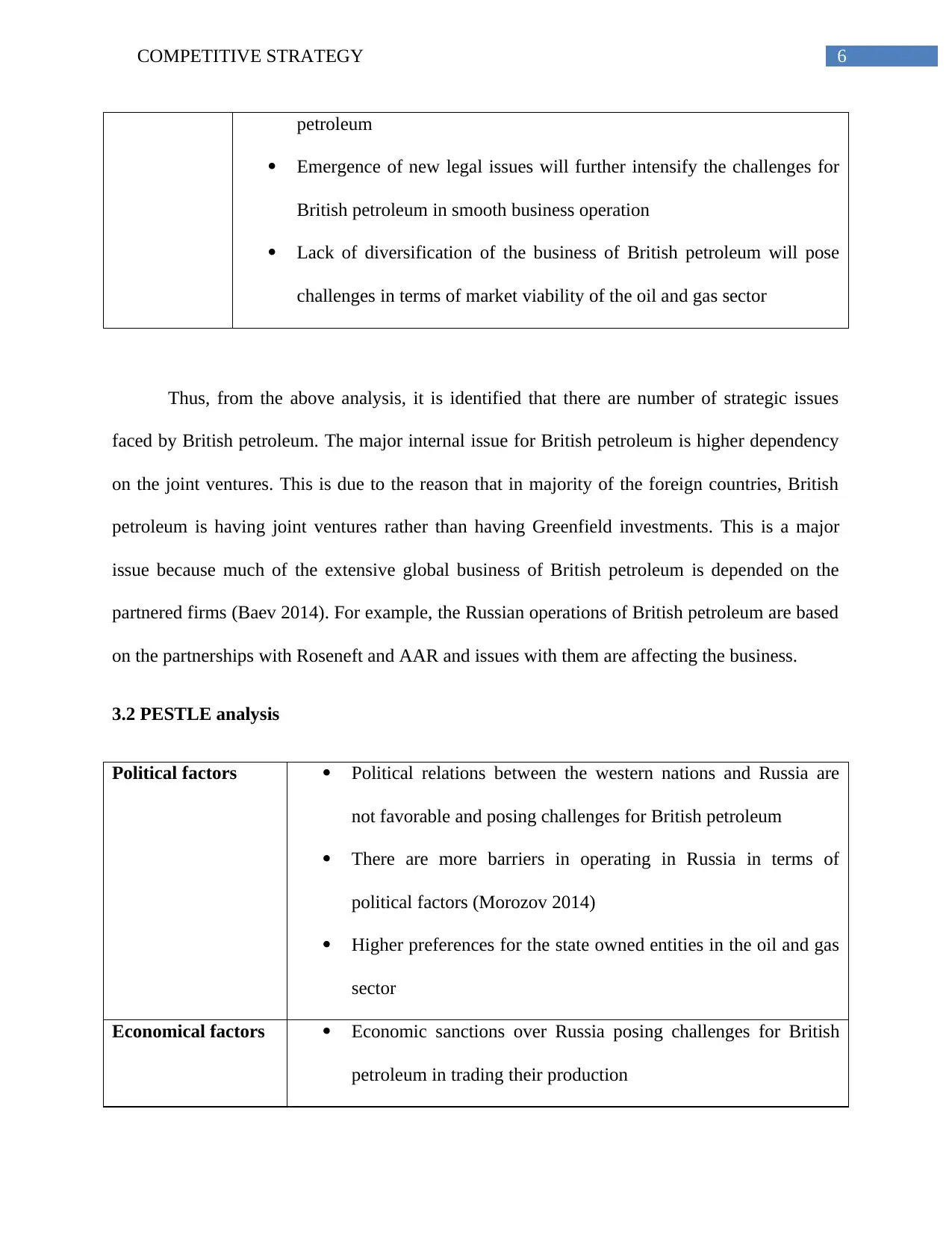
6COMPETITIVE STRATEGY
petroleum
Emergence of new legal issues will further intensify the challenges for
British petroleum in smooth business operation
Lack of diversification of the business of British petroleum will pose
challenges in terms of market viability of the oil and gas sector
Thus, from the above analysis, it is identified that there are number of strategic issues
faced by British petroleum. The major internal issue for British petroleum is higher dependency
on the joint ventures. This is due to the reason that in majority of the foreign countries, British
petroleum is having joint ventures rather than having Greenfield investments. This is a major
issue because much of the extensive global business of British petroleum is depended on the
partnered firms (Baev 2014). For example, the Russian operations of British petroleum are based
on the partnerships with Roseneft and AAR and issues with them are affecting the business.
3.2 PESTLE analysis
Political factors Political relations between the western nations and Russia are
not favorable and posing challenges for British petroleum
There are more barriers in operating in Russia in terms of
political factors (Morozov 2014)
Higher preferences for the state owned entities in the oil and gas
sector
Economical factors Economic sanctions over Russia posing challenges for British
petroleum in trading their production
petroleum
Emergence of new legal issues will further intensify the challenges for
British petroleum in smooth business operation
Lack of diversification of the business of British petroleum will pose
challenges in terms of market viability of the oil and gas sector
Thus, from the above analysis, it is identified that there are number of strategic issues
faced by British petroleum. The major internal issue for British petroleum is higher dependency
on the joint ventures. This is due to the reason that in majority of the foreign countries, British
petroleum is having joint ventures rather than having Greenfield investments. This is a major
issue because much of the extensive global business of British petroleum is depended on the
partnered firms (Baev 2014). For example, the Russian operations of British petroleum are based
on the partnerships with Roseneft and AAR and issues with them are affecting the business.
3.2 PESTLE analysis
Political factors Political relations between the western nations and Russia are
not favorable and posing challenges for British petroleum
There are more barriers in operating in Russia in terms of
political factors (Morozov 2014)
Higher preferences for the state owned entities in the oil and gas
sector
Economical factors Economic sanctions over Russia posing challenges for British
petroleum in trading their production
Paraphrase This Document
Need a fresh take? Get an instant paraphrase of this document with our AI Paraphraser
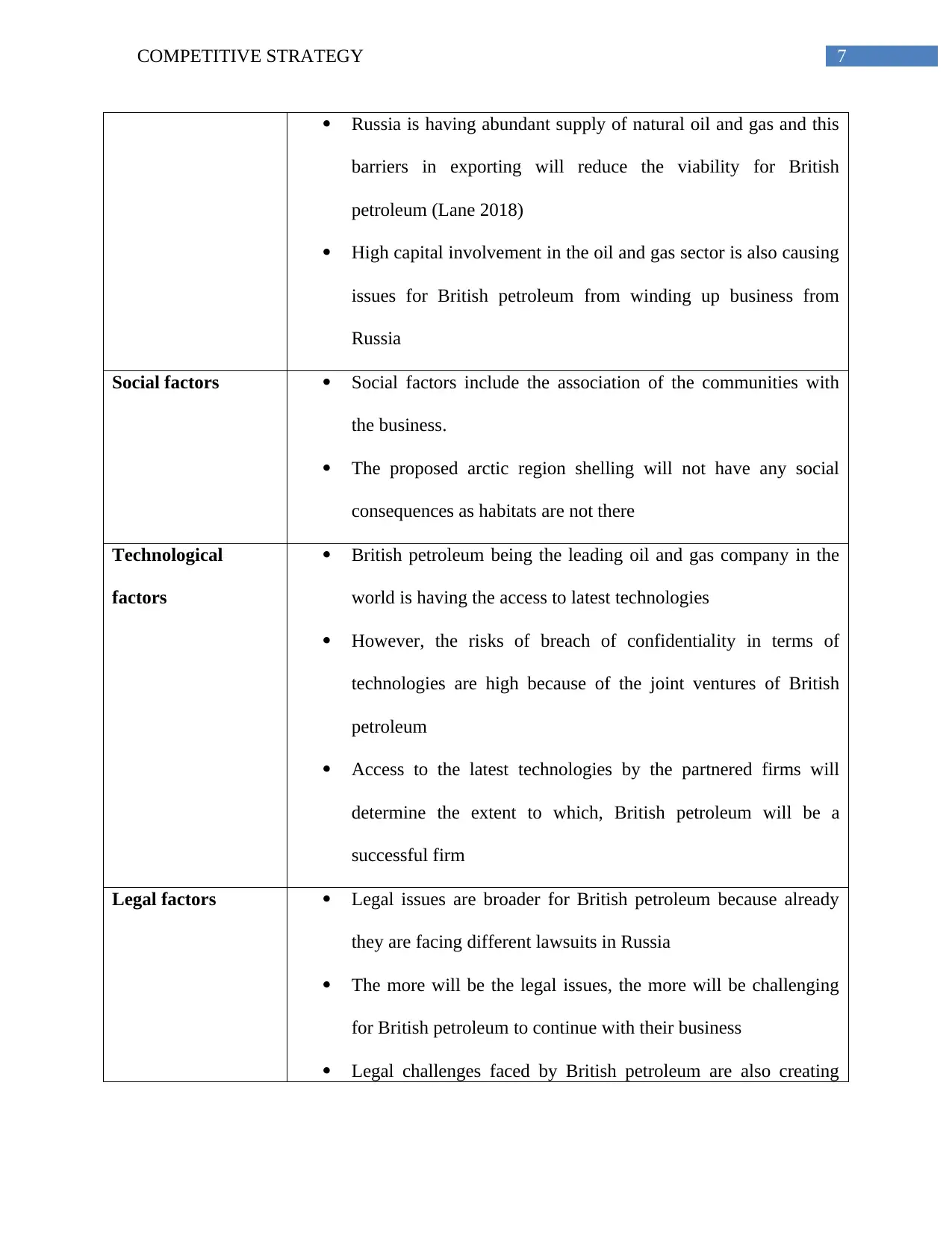
7COMPETITIVE STRATEGY
Russia is having abundant supply of natural oil and gas and this
barriers in exporting will reduce the viability for British
petroleum (Lane 2018)
High capital involvement in the oil and gas sector is also causing
issues for British petroleum from winding up business from
Russia
Social factors Social factors include the association of the communities with
the business.
The proposed arctic region shelling will not have any social
consequences as habitats are not there
Technological
factors
British petroleum being the leading oil and gas company in the
world is having the access to latest technologies
However, the risks of breach of confidentiality in terms of
technologies are high because of the joint ventures of British
petroleum
Access to the latest technologies by the partnered firms will
determine the extent to which, British petroleum will be a
successful firm
Legal factors Legal issues are broader for British petroleum because already
they are facing different lawsuits in Russia
The more will be the legal issues, the more will be challenging
for British petroleum to continue with their business
Legal challenges faced by British petroleum are also creating
Russia is having abundant supply of natural oil and gas and this
barriers in exporting will reduce the viability for British
petroleum (Lane 2018)
High capital involvement in the oil and gas sector is also causing
issues for British petroleum from winding up business from
Russia
Social factors Social factors include the association of the communities with
the business.
The proposed arctic region shelling will not have any social
consequences as habitats are not there
Technological
factors
British petroleum being the leading oil and gas company in the
world is having the access to latest technologies
However, the risks of breach of confidentiality in terms of
technologies are high because of the joint ventures of British
petroleum
Access to the latest technologies by the partnered firms will
determine the extent to which, British petroleum will be a
successful firm
Legal factors Legal issues are broader for British petroleum because already
they are facing different lawsuits in Russia
The more will be the legal issues, the more will be challenging
for British petroleum to continue with their business
Legal challenges faced by British petroleum are also creating
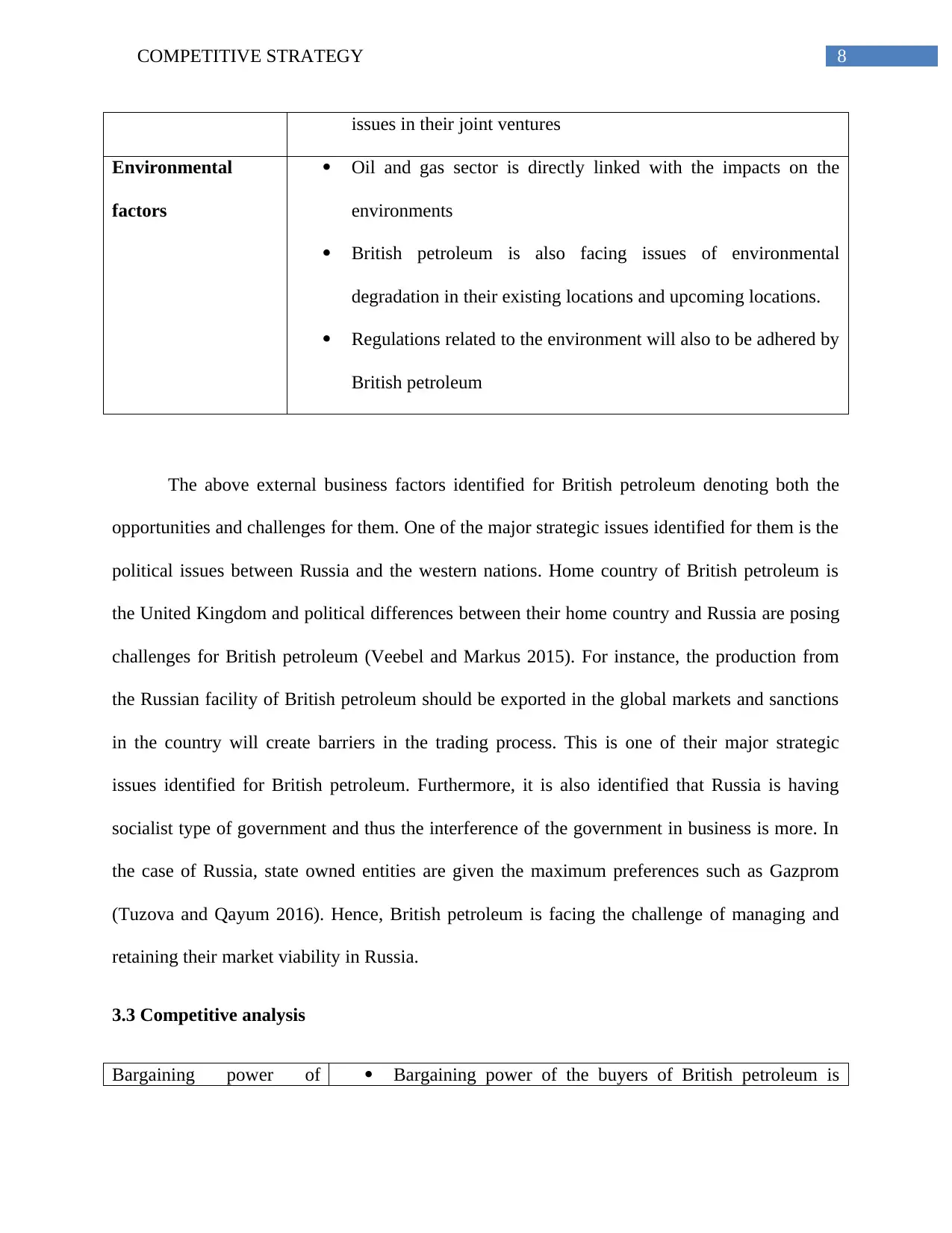
8COMPETITIVE STRATEGY
issues in their joint ventures
Environmental
factors
Oil and gas sector is directly linked with the impacts on the
environments
British petroleum is also facing issues of environmental
degradation in their existing locations and upcoming locations.
Regulations related to the environment will also to be adhered by
British petroleum
The above external business factors identified for British petroleum denoting both the
opportunities and challenges for them. One of the major strategic issues identified for them is the
political issues between Russia and the western nations. Home country of British petroleum is
the United Kingdom and political differences between their home country and Russia are posing
challenges for British petroleum (Veebel and Markus 2015). For instance, the production from
the Russian facility of British petroleum should be exported in the global markets and sanctions
in the country will create barriers in the trading process. This is one of their major strategic
issues identified for British petroleum. Furthermore, it is also identified that Russia is having
socialist type of government and thus the interference of the government in business is more. In
the case of Russia, state owned entities are given the maximum preferences such as Gazprom
(Tuzova and Qayum 2016). Hence, British petroleum is facing the challenge of managing and
retaining their market viability in Russia.
3.3 Competitive analysis
Bargaining power of Bargaining power of the buyers of British petroleum is
issues in their joint ventures
Environmental
factors
Oil and gas sector is directly linked with the impacts on the
environments
British petroleum is also facing issues of environmental
degradation in their existing locations and upcoming locations.
Regulations related to the environment will also to be adhered by
British petroleum
The above external business factors identified for British petroleum denoting both the
opportunities and challenges for them. One of the major strategic issues identified for them is the
political issues between Russia and the western nations. Home country of British petroleum is
the United Kingdom and political differences between their home country and Russia are posing
challenges for British petroleum (Veebel and Markus 2015). For instance, the production from
the Russian facility of British petroleum should be exported in the global markets and sanctions
in the country will create barriers in the trading process. This is one of their major strategic
issues identified for British petroleum. Furthermore, it is also identified that Russia is having
socialist type of government and thus the interference of the government in business is more. In
the case of Russia, state owned entities are given the maximum preferences such as Gazprom
(Tuzova and Qayum 2016). Hence, British petroleum is facing the challenge of managing and
retaining their market viability in Russia.
3.3 Competitive analysis
Bargaining power of Bargaining power of the buyers of British petroleum is
⊘ This is a preview!⊘
Do you want full access?
Subscribe today to unlock all pages.

Trusted by 1+ million students worldwide
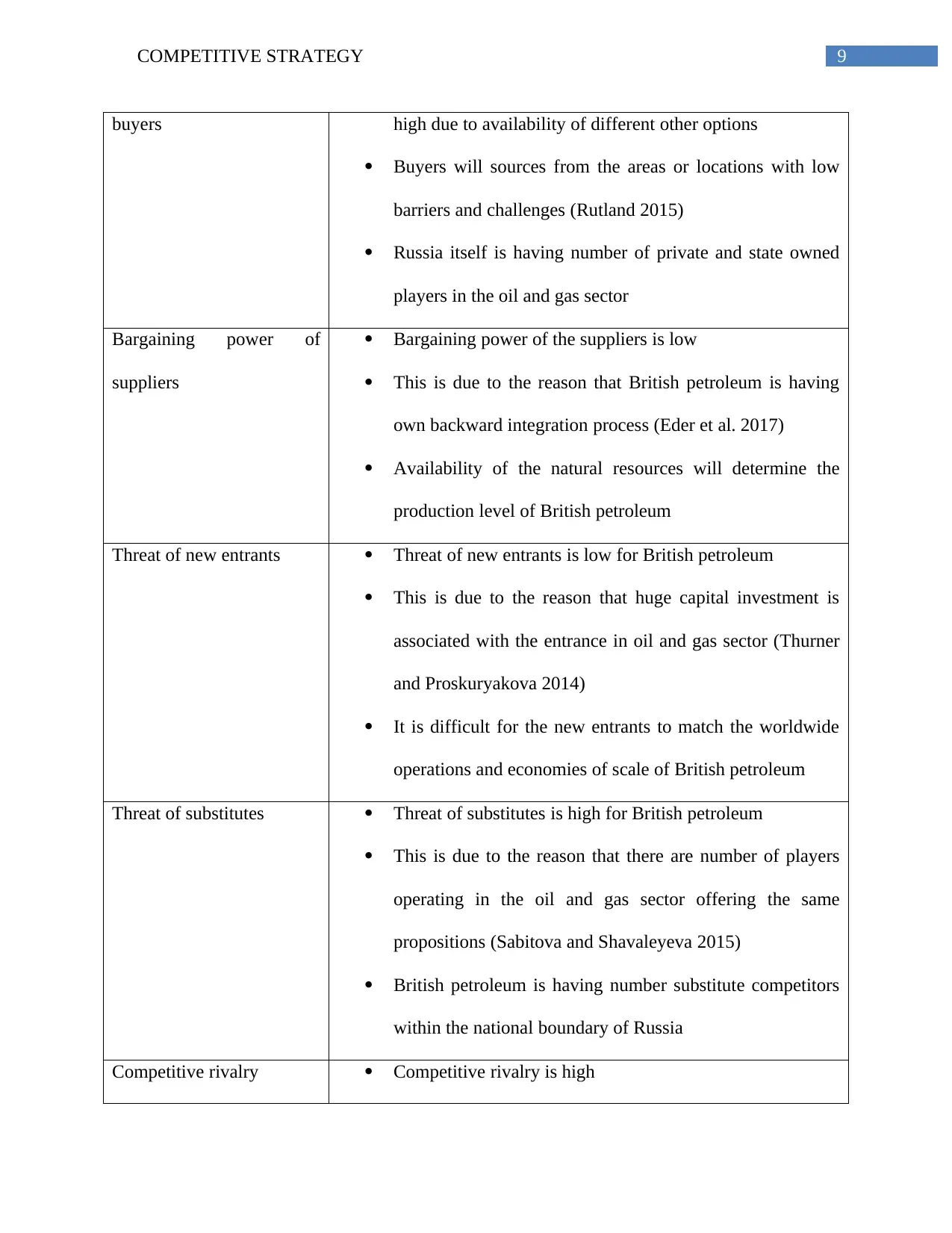
9COMPETITIVE STRATEGY
buyers high due to availability of different other options
Buyers will sources from the areas or locations with low
barriers and challenges (Rutland 2015)
Russia itself is having number of private and state owned
players in the oil and gas sector
Bargaining power of
suppliers
Bargaining power of the suppliers is low
This is due to the reason that British petroleum is having
own backward integration process (Eder et al. 2017)
Availability of the natural resources will determine the
production level of British petroleum
Threat of new entrants Threat of new entrants is low for British petroleum
This is due to the reason that huge capital investment is
associated with the entrance in oil and gas sector (Thurner
and Proskuryakova 2014)
It is difficult for the new entrants to match the worldwide
operations and economies of scale of British petroleum
Threat of substitutes Threat of substitutes is high for British petroleum
This is due to the reason that there are number of players
operating in the oil and gas sector offering the same
propositions (Sabitova and Shavaleyeva 2015)
British petroleum is having number substitute competitors
within the national boundary of Russia
Competitive rivalry Competitive rivalry is high
buyers high due to availability of different other options
Buyers will sources from the areas or locations with low
barriers and challenges (Rutland 2015)
Russia itself is having number of private and state owned
players in the oil and gas sector
Bargaining power of
suppliers
Bargaining power of the suppliers is low
This is due to the reason that British petroleum is having
own backward integration process (Eder et al. 2017)
Availability of the natural resources will determine the
production level of British petroleum
Threat of new entrants Threat of new entrants is low for British petroleum
This is due to the reason that huge capital investment is
associated with the entrance in oil and gas sector (Thurner
and Proskuryakova 2014)
It is difficult for the new entrants to match the worldwide
operations and economies of scale of British petroleum
Threat of substitutes Threat of substitutes is high for British petroleum
This is due to the reason that there are number of players
operating in the oil and gas sector offering the same
propositions (Sabitova and Shavaleyeva 2015)
British petroleum is having number substitute competitors
within the national boundary of Russia
Competitive rivalry Competitive rivalry is high
Paraphrase This Document
Need a fresh take? Get an instant paraphrase of this document with our AI Paraphraser
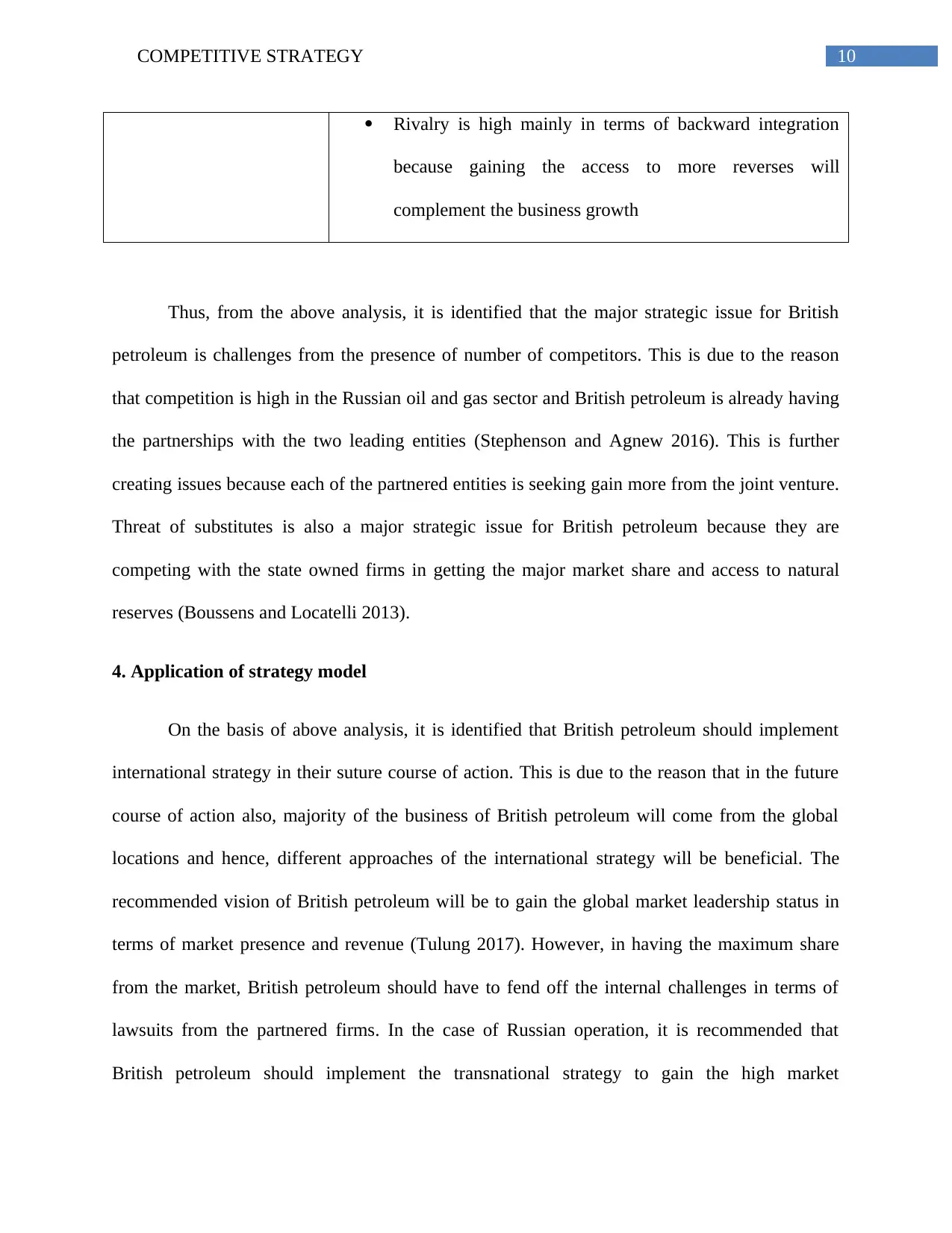
10COMPETITIVE STRATEGY
Rivalry is high mainly in terms of backward integration
because gaining the access to more reverses will
complement the business growth
Thus, from the above analysis, it is identified that the major strategic issue for British
petroleum is challenges from the presence of number of competitors. This is due to the reason
that competition is high in the Russian oil and gas sector and British petroleum is already having
the partnerships with the two leading entities (Stephenson and Agnew 2016). This is further
creating issues because each of the partnered entities is seeking gain more from the joint venture.
Threat of substitutes is also a major strategic issue for British petroleum because they are
competing with the state owned firms in getting the major market share and access to natural
reserves (Boussens and Locatelli 2013).
4. Application of strategy model
On the basis of above analysis, it is identified that British petroleum should implement
international strategy in their suture course of action. This is due to the reason that in the future
course of action also, majority of the business of British petroleum will come from the global
locations and hence, different approaches of the international strategy will be beneficial. The
recommended vision of British petroleum will be to gain the global market leadership status in
terms of market presence and revenue (Tulung 2017). However, in having the maximum share
from the market, British petroleum should have to fend off the internal challenges in terms of
lawsuits from the partnered firms. In the case of Russian operation, it is recommended that
British petroleum should implement the transnational strategy to gain the high market
Rivalry is high mainly in terms of backward integration
because gaining the access to more reverses will
complement the business growth
Thus, from the above analysis, it is identified that the major strategic issue for British
petroleum is challenges from the presence of number of competitors. This is due to the reason
that competition is high in the Russian oil and gas sector and British petroleum is already having
the partnerships with the two leading entities (Stephenson and Agnew 2016). This is further
creating issues because each of the partnered entities is seeking gain more from the joint venture.
Threat of substitutes is also a major strategic issue for British petroleum because they are
competing with the state owned firms in getting the major market share and access to natural
reserves (Boussens and Locatelli 2013).
4. Application of strategy model
On the basis of above analysis, it is identified that British petroleum should implement
international strategy in their suture course of action. This is due to the reason that in the future
course of action also, majority of the business of British petroleum will come from the global
locations and hence, different approaches of the international strategy will be beneficial. The
recommended vision of British petroleum will be to gain the global market leadership status in
terms of market presence and revenue (Tulung 2017). However, in having the maximum share
from the market, British petroleum should have to fend off the internal challenges in terms of
lawsuits from the partnered firms. In the case of Russian operation, it is recommended that
British petroleum should implement the transnational strategy to gain the high market
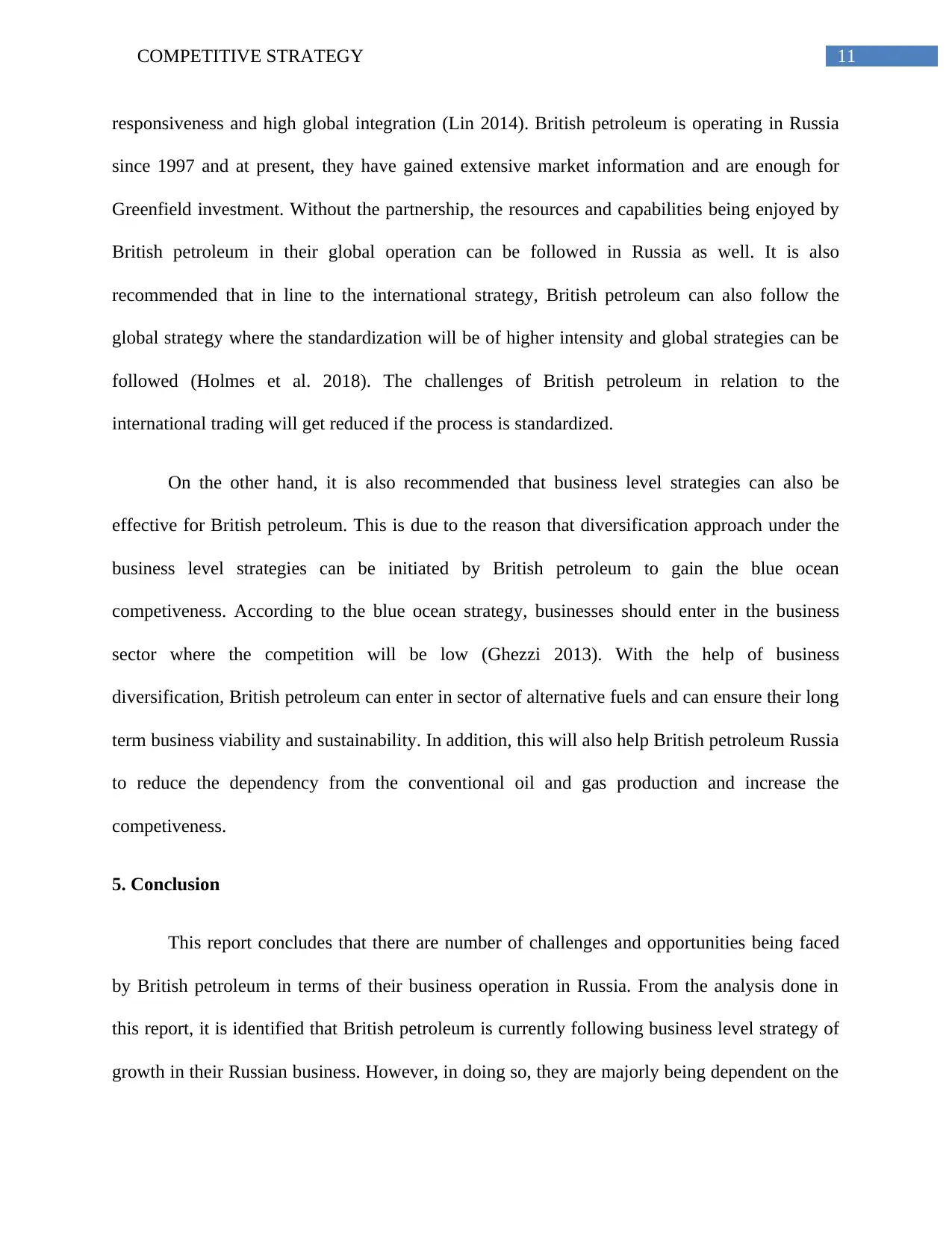
11COMPETITIVE STRATEGY
responsiveness and high global integration (Lin 2014). British petroleum is operating in Russia
since 1997 and at present, they have gained extensive market information and are enough for
Greenfield investment. Without the partnership, the resources and capabilities being enjoyed by
British petroleum in their global operation can be followed in Russia as well. It is also
recommended that in line to the international strategy, British petroleum can also follow the
global strategy where the standardization will be of higher intensity and global strategies can be
followed (Holmes et al. 2018). The challenges of British petroleum in relation to the
international trading will get reduced if the process is standardized.
On the other hand, it is also recommended that business level strategies can also be
effective for British petroleum. This is due to the reason that diversification approach under the
business level strategies can be initiated by British petroleum to gain the blue ocean
competiveness. According to the blue ocean strategy, businesses should enter in the business
sector where the competition will be low (Ghezzi 2013). With the help of business
diversification, British petroleum can enter in sector of alternative fuels and can ensure their long
term business viability and sustainability. In addition, this will also help British petroleum Russia
to reduce the dependency from the conventional oil and gas production and increase the
competiveness.
5. Conclusion
This report concludes that there are number of challenges and opportunities being faced
by British petroleum in terms of their business operation in Russia. From the analysis done in
this report, it is identified that British petroleum is currently following business level strategy of
growth in their Russian business. However, in doing so, they are majorly being dependent on the
responsiveness and high global integration (Lin 2014). British petroleum is operating in Russia
since 1997 and at present, they have gained extensive market information and are enough for
Greenfield investment. Without the partnership, the resources and capabilities being enjoyed by
British petroleum in their global operation can be followed in Russia as well. It is also
recommended that in line to the international strategy, British petroleum can also follow the
global strategy where the standardization will be of higher intensity and global strategies can be
followed (Holmes et al. 2018). The challenges of British petroleum in relation to the
international trading will get reduced if the process is standardized.
On the other hand, it is also recommended that business level strategies can also be
effective for British petroleum. This is due to the reason that diversification approach under the
business level strategies can be initiated by British petroleum to gain the blue ocean
competiveness. According to the blue ocean strategy, businesses should enter in the business
sector where the competition will be low (Ghezzi 2013). With the help of business
diversification, British petroleum can enter in sector of alternative fuels and can ensure their long
term business viability and sustainability. In addition, this will also help British petroleum Russia
to reduce the dependency from the conventional oil and gas production and increase the
competiveness.
5. Conclusion
This report concludes that there are number of challenges and opportunities being faced
by British petroleum in terms of their business operation in Russia. From the analysis done in
this report, it is identified that British petroleum is currently following business level strategy of
growth in their Russian business. However, in doing so, they are majorly being dependent on the
⊘ This is a preview!⊘
Do you want full access?
Subscribe today to unlock all pages.

Trusted by 1+ million students worldwide
1 out of 16
Related Documents
Your All-in-One AI-Powered Toolkit for Academic Success.
+13062052269
info@desklib.com
Available 24*7 on WhatsApp / Email
![[object Object]](/_next/static/media/star-bottom.7253800d.svg)
Unlock your academic potential
Copyright © 2020–2026 A2Z Services. All Rights Reserved. Developed and managed by ZUCOL.




